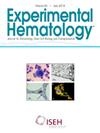Splicing the Difference: Harnessing the Complexity of the Transcriptome in Hematopoiesis
IF 2.5
4区 医学
Q2 HEMATOLOGY
引用次数: 0
Abstract
Alternative splicing has long been recognized as a powerful tool to expand the diversity of the transcriptome and the proteome. The study of hematopoiesis, from hematopoietic stem cell maintenance and differentiation into committed progenitors to maturation into functional blood cells, has led the field of stem cell research and cellular differentiation for decades. The importance of aberrant splicing due to mutations in cis has been exemplified in thalassemias, resulting from aberrant expression of β-globin. The simultaneous development of increasingly sophisticated technologies, in particular the combination of multicolor flow cytometric cell sorting with bulk and single-cell sequencing, has provided sophisticated insights into the complex regulation of the blood system. The recognition that mutations in key splicing factors drive myeloid malignancies, in particular myelodysplastic syndromes, has galvanized research into alternative splicing in hematopoiesis and its diseases.
In this review, we will update the audience on the exciting novel technologies, highlight alternative splicing events and their regulators with essential functions in hematopoiesis, and provide a high-level overview how splicing factor mutations contribute to hematologic malignancies.
剪接差异:利用造血过程中转录组的复杂性。
长期以来,人们一直认为替代剪接是扩大转录组和蛋白质组多样性的有力工具。对造血的研究,从造血干细胞的维持、分化为有责任感的祖细胞到成熟为功能性血细胞,几十年来一直引领着干细胞研究和细胞分化领域。在地中海贫血症中,由于β-球蛋白的异常表达,顺式突变导致的异常剪接非常重要。与此同时,越来越先进的技术,特别是多色流式细胞分选技术与大量和单细胞测序技术的结合,使人们对血液系统的复杂调控有了更深入的了解。人们认识到,关键剪接因子的突变会导致骨髓恶性肿瘤,尤其是骨髓增生异常综合征,这激发了对造血及其疾病中替代剪接的研究。在这篇综述中,我们将向听众介绍令人兴奋的新技术的最新进展,重点介绍在造血过程中具有重要功能的替代剪接事件及其调控因子,并高度概括剪接因子突变是如何导致血液系统恶性肿瘤的。
本文章由计算机程序翻译,如有差异,请以英文原文为准。
求助全文
约1分钟内获得全文
求助全文
来源期刊

Experimental hematology
医学-血液学
CiteScore
5.30
自引率
0.00%
发文量
84
审稿时长
58 days
期刊介绍:
Experimental Hematology publishes new findings, methodologies, reviews and perspectives in all areas of hematology and immune cell formation on a monthly basis that may include Special Issues on particular topics of current interest. The overall goal is to report new insights into how normal blood cells are produced, how their production is normally regulated, mechanisms that contribute to hematological diseases and new approaches to their treatment. Specific topics may include relevant developmental and aging processes, stem cell biology, analyses of intrinsic and extrinsic regulatory mechanisms, in vitro behavior of primary cells, clonal tracking, molecular and omics analyses, metabolism, epigenetics, bioengineering approaches, studies in model organisms, novel clinical observations, transplantation biology and new therapeutic avenues.
 求助内容:
求助内容: 应助结果提醒方式:
应助结果提醒方式:


